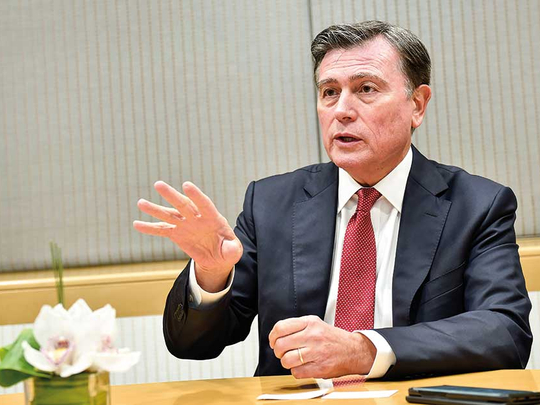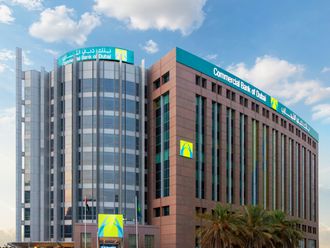
Dubai: The UAE, specifically Dubai, is at the core of the regional business strategy of Standard Chartered, José Viñals, chairman of the group told Gulf News in an interview.
Visiting Dubai last week as part of the bank’s board meeting in the city, Viñals met High Highness Shaikh Mohammad Bin Rashid Al Maktoum, Vice-President and Prime Minister of the UAE and Ruler of Dubai, and reiterated the bank’s commitment to the country.
“Standard Chartered is fully committed to the UAE, Dubai and the Dubai International Financial Centre (DIFC). We started operations in 1958. We have been participating in the financing of all the major infrastructure projects here. Dubai and the DIFC are extraordinary habitats for the businesses,” said Viñals.
- José Viñals | Chairman of Standard Chartered
In addition to the UAE-focused banking business, Vinals said the UAE is the core of Standard Chartered’s Islamic banking and financial services business and that the country plays a central role in the bank’s Africa and Middle East strategy.
Africa and the Middle East business of Standard Chartered comprises of operations in more than 25 countries and the UAE is one of the top markets for Standard Chartered worldwide.
Regional opportunities
The fast pace of economic reforms happening in the Middle East, particularly in the GCC countries following the prolonged low oil prices are offering big opportunities.
“I think there are tremendous opportunities arising from the processes of modernisation and diversification that we are seeing throughout the region. Things that are happening here, particularly in Dubai in terms of the initiatives that have been taken to convert it into a smart city and the government’s efforts to involve directly in developments in artificial intelligence, are innovative and pioneering,” said Viñals.
Viñals is also very optimistic about the pace of economic reforms happening in Saudi Arabia. “In Saudi Arabia, we are already operating with Capital Markets Authority (CMA) licence to provide capital market- and related financial services. We are monitoring the developments there very closely and exploring business opportunities related to Vision 2030. We think achieving the vision is very important in terms of the diversification of the Saudi economy,” he said.
Standard Chartered’s presence in the UAE, he said, is very important for its role in supporting global trade. “The ability of Dubai to connect Asia and Africa is very critical. We see tremendous opportunities including the closer relationship between the UAE and China through the One Belt, One Road initiative,” he said.
According to Standard Chartered, the UAE’s well-established trade-hub status, market infrastructure, regulatory and government support gives it a key role in the One Belt, One Road initiative. Standard Chartered estimates China is planning to invest about $1 trillion in infrastructure along the Belt and Road trade routes over the next decade, much of it in the Middle East and North Africa. Current outbound investment by Chinese firms into the Gulf region — projected to be around 20 per cent of total volume by numerous sources — makes the calculations surrounding the opportunity straightforward for both the Middle East and the hubs seeking to facilitate its business with China.
With its presence across, Asia-Pacific, South Asia and ASEAN countries and the Middle East, Standard Chartered expects to play a very important role as a bridge between Asia and Africa. The bank is present in 15 countries in Africa and has the broadest presence in the One Belt, One Road initiative. Out of the 60 plus countries along the route, the bank is present in 45 countries.
“We have been involved in a number of projects along the One Belt One Road. In 2016, we have been involved in about 40 projects along this initiative. We have been involved in financing of projects amounting to $20 billion,” he said.










